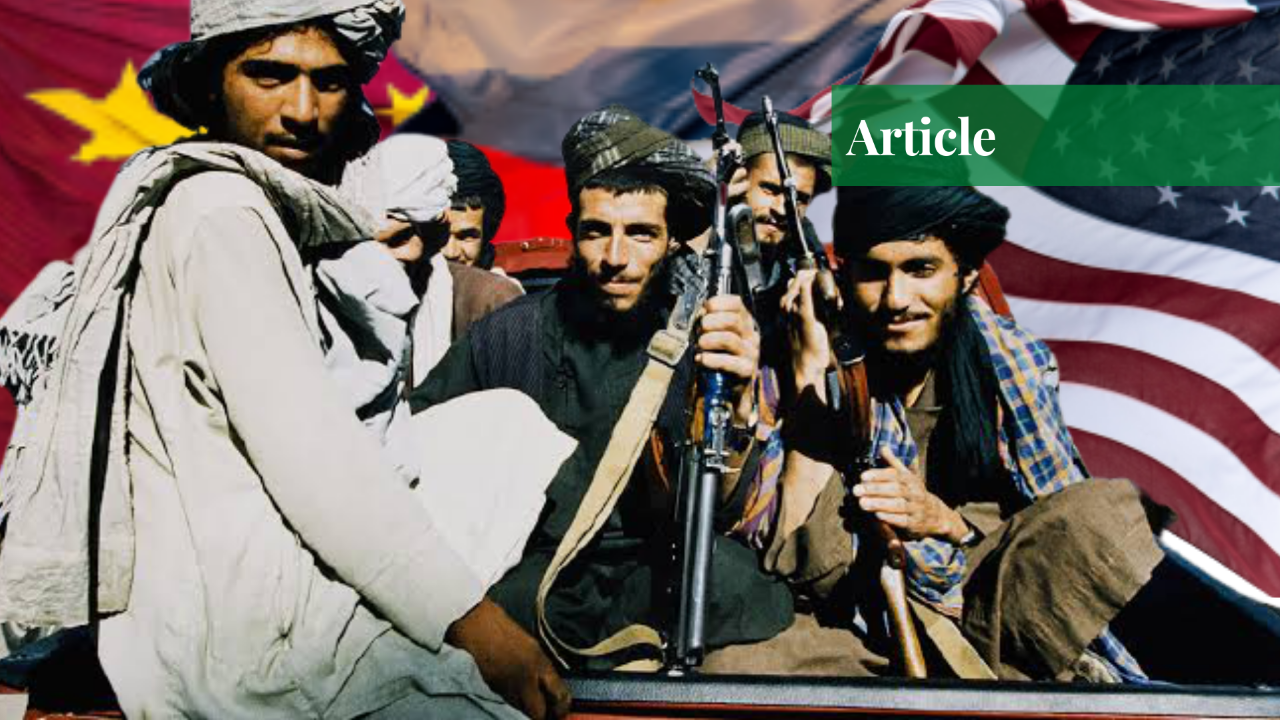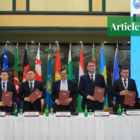Mr Muhammad Hamza Tanvir is an independent journalist and a political analyst, focusing primarily on regional and global strategic and political issues. He has authored numerous articles for different national and international publications.
Taliban, along with occupying more and more land in Afghanistan in the aftermath of the US withdrawal, are asserting themselves diplomatically and developing relations in the region. Many analysts presumed that the rise of the Taliban in Afghanistan would open new ventures of instability in the region as they would try to open new fronts in the region for the Uyghur Muslims and Kashmiris, but given the new strategy of the Taliban, it seems otherwise.
It looks like the Taliban are all set to establish diplomatic ties and partnerships with regional powers to start a new era of development and stability in their country. Seeking the international recognition of the possible Taliban government in Afghanistan is also one of the prime reasons that they have opened their arms to the regional powers.
Sino-Taliban Relations
The most recent diplomatic venture was held in Tianjin between the Taliban and China on 28th July 2021. Although the United States has welcomed the China-Taliban talks, the meeting entails many frets for India because of its anti-Taliban role in Afghanistan. The emergence of the Taliban as a new stakeholder in the region has changed the dynamics of regional politics.
On one hand, it could start a new era of cooperation among the anti-West allies while, on the other hand, it could open new doors to religious uprisings in the neighboring countries. It is also likely that it will have a serious impact on global politics as it will shift the power dynamics between the two blocs of the new cold war.
The China-Taliban meeting delineates that a new bloc is in making in the region which will have solemn implications for the United States and its allies, and also for ISIS which will have to face a much stronger enemy in the form of Taliban with the backing of China, Turkey, Russia, Iran, and Pakistan. In the future, more Taliban diplomatic meetings with the regional powers are likely to be held as they seek legitimacy on the international stage.
The recent meeting between China and the Taliban delegation was held at the invitation of Beijing. The meeting is being surmised as a gift to the Taliban from China as it gives the sign that the insurgent group is being given legitimacy by the regional hegemon, but the truth is that the US government was the first one to have granted legitimacy to the Afghan Taliban by signing Doha peace accords last year.
Both sides, China and the Taliban have their interests in the region for which they seek each other’s assistance. China, on its part, wants a stable neighboring country which is crucial for its smooth rise internationally and it also wants to cajole the Taliban so that they do not assist the separatist movement in Xinjiang.
On the other hand, the Taliban seek international recognition from its most likely government in Afghanistan. They also need some economically stable patrons to ensure stability and development in their country, and China is perfect for meeting such expectations as it is one of the biggest technology giants in the world.
China also wants the Taliban to be in their camp to counter the US bloc in the global arena. The collapse of the central government in Afghanistan can fuel civil war in the country. So, the regional powers – particularly China – have to take the mantle of bringing stability to the country by supporting whatever government the Afghan people want.
The recent meeting had on its agenda the concerns of both sides and promises to avoid any sort of conflicts in the future. China apprised the Taliban about their concern regarding the fear of Afghan soil being used against the former in the future as a staging ground for the East Turkestan Islamic Movement as it is a direct threat to China’s sovereignty and national security.
Taliban assured the Chinese officials that they will not let the Afghan soil be used against any country. Similarly, China also assured the Taliban that it would not meddle in the internal matters of Afghanistan, rather, it would assist in solving matters and bring peace to the country.
Although the US Secretary of State, Antony Blinken, has attributed the meeting to a ‘positive thing’, it is well known that the US would never want a rapprochement between China and the Taliban because the consequences of such an alliance would prove to be highly inimical for the US and its regional ally India. The alliance between China and the Taliban could also be used as an opportunity by the former to link Chabahar to its cities via Afghanistan peacefully and safely.
Taliban-Russia Ties
Russia, formerly known as the Soviet Union, was defeated in Afghanistan by the Taliban with the help of US assistance. The US labeled the Taliban as Mujahideen and trained them to fight against its arch-rival Soviet Union (USSR) but as ‘change alone is perennial’, the two former allies turned against each other after defeating USSR.
Wounded Russia then used the same Taliban to humiliate and covertly take revenge on the US. Russia was one of the first countries to engage the Taliban in peace talks. The former has many reasons to make peace with the Taliban. One of the most prominent reasons is that it does not wants a US-backed government in its backyard.
It also needs a strong ally to counter the emerging threat of ISIS and Al-Qaeda along its borders as is evident from the statement of Zamir Kabulov, the Russian envoy to Afghanistan, the Taliban’s advance is a security boost for Russia as it will wipe out more dangerous jihadist groups. Russia also conducted a military drill along the Tajikistan-Afghanistan border to protect its ally from the reverberations of a possible collapse of the central government in Afghanistan.
Taliban government in Afghanistan can spur a wave of refugee influx in its neighbors and can also fuel the uprising of insurgent groups in Tajikistan which could be detrimental for Russia. The alliance between Russia and the Taliban would entail stability and development in Afghanistan.
It would also give more weight to Russia in the international arena, but the country would have to pay the Taliban for its alliance in terms of development projects in Afghanistan because the Taliban would expect this in return for their services to counter the ISIS threat.
Russia will also have to face difficulties from India, one of its largest trade partners, if it moves closer to the Taliban. Taliban would not want to miss the opportunity to establish diplomatic ties with the Russian government as Moscow holds an eminent position on the global stage and could be a source to further the Taliban’s interest internationally.
Iran and Turkey’s Relations with the Taliban
Following the ancient notion: “Enemy of my enemy is my friend”, Iran and the Taliban are growing closer. The ties between them are crucial for both of them; as for Iran, it would be an opportunity to have a strong ally in Afghanistan where the Shia sect is at stake due to the rise of many anti-Shia insurgent groups like ISIS and Al-Qaeda.
Although the relations between the Taliban and the Shia groups in Afghanistan were never good enough and in the past, the Hazara community of Afghanistan had to face thousands of executions when the Taliban came to power previously, the Iranian government is eyeing ties with the Taliban.
It seems that Iran has changed its strategy and this time it wants to pressurize the Taliban through affection and other coaxing means. Better relations between Iran and the Taliban could prove to be a good omen for Hazara Shias as it would refrain the Taliban from taking any sort of discriminatory action against them lest the deterioration of relations with Iran.
Taliban-Turkey Relations: Taking the Turn for the Worse
The relations between Turkey and the Taliban are turning sour due to the willingness of the former to provide security to Kabul’s international airport. Taliban has taken this desire of Turkey as an offense and has threatened the Turkish government with waging ‘Jihad’ against their force if they stay in Afghanistan after the withdrawal of the US. Taliban in their statement maintained that they will take Turkish forces as occupiers on their land.
The US has asked Turkey to secure Kabul’s international airport after the complete withdrawal of NATO forces. Turkey’s desire for being a European Union member is well known and it is assumed that the acceptance of the US’s offer to protect Kabul’s airport by Turkey is a part of their strategy to be a ‘good boy’ in the eyes of the West.
If Turkey stays in Afghanistan after the withdrawal of NATO forces, it could become the worst nightmare for Erdogan’s government, as the Taliban, who are now more confident than ever because of their win over the US, will react more harshly and this war could go inside the borders of Turkey and can augment the uprising of insurgent groups inside Turkey.
Future Trajectory of Taliban-Pakistan: A Nightmare for India
Pakistan has played a significant role in the peace talks between the Taliban and the United States. Pakistan has always advocated the peaceful settlement of the Afghan issue but was shushed by the international pressure, for which the country has paid a heavy price. Pakistan and US relations have also suffered because of Pakistan’s relationship with the Taliban government in Afghanistan. Doha Peace Accord has proved that Pakistan’s views were right.
The West, especially the US, has always blamed Pakistan for its failure in the Afghan war, brushing aside the sacrifices Pakistan made in this war. Pakistan has always denied such notions. The relations between the Afghan Taliban and Pakistan are likely to be of cooperation and cordiality but not of patron and client as many perceive it to be.
Taliban are no more under the duress of international invaders and are much more confident than ever. Many in the West think that Pakistan has the power to dictate them, but the Taliban will not take orders from anyone. Prime Minister Imran Khan aptly stated that the Taliban would not listen to us [Pakistan] when they are sensing victory while refuting the Afghan President Ashraf Ghani’s allegations against Pakistan.
Pakistan’s relations with the Taliban will likely be good in the future because the Taliban see Pakistan as a Muslim brother country. The anti-Taliban role of India in the Afghan war has also played a significant role in cementing the Taliban’s sense of fraternity with Pakistan. India had ambitions to reach Central Asian countries by gaining a strong footing in Afghanistan and also to threaten Pakistan.
India somehow succeeded for a while in making the second ambition turn true, but it invested on the wrong side because the US-backed government in Afghanistan does not seem to be able to hold on for long now. India is also worried because of the atrocities it is conducting in Indian Illegally Occupied Kashmir. The Taliban government in Afghanistan will prove to be a nightmare for India as it will shun India’s designs against Pakistan and the Kashmiri people.
If you want to submit your articles and/or research papers, please check the Submissions page.
The views and opinions expressed in this article/paper are the author’s own and do not necessarily reflect the editorial position of Paradigm Shift.



















